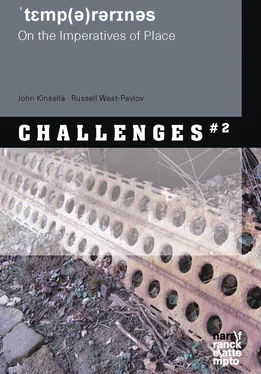As a writer, and a poet in particular, I think I have to be aware of all these houses, environments, ecologies. Even when I am ranting against a particular destruction, I need to do so in an informed way; consider all the possible interpretations; critique the words I am using. Nothing in language, for me, is random, though language seems to resist this confidence and introduces elements of the random I can’t track or control, and thank goodness for that. Language is not just a tool—a tool of control, yet also empowerment—but also, for me, a living entity with a strength outside human subjectivity. Language is of animal and plant, of rock and vacuum, as much as human. It is elemental. Language is part of all ecologies, all environments, and is many houses at once.
When I write poetry against invasiveness, I do so knowing language will be critiquing me as much as I it, and that it will likely work as a weed, a garden escapee, and invade the very ecologies I am seeking to protect. For that’s the difference between, say, the invasiveness of colonial usurpers introducing the fox into Australia for the purposes of hunting-entertainment, and the fox escaping their ‘jurisdiction’ and going ‘feral’ and colonising the Australian landmass in the process. Two forms of colonialism: one is an act of choice for self-benefit (the introduction of the fox) and the other a case of survival (the fox expanding its range).
Now, like the cat, the fox has devastated the natural environment, and is shot, poisoned, and displayed as trophy throughout the country. A large part of this killing is pleasure-based. I know of many hunters who thrill-kill foxes, and if they didn’t get that thrill they’d be spending their time getting wasted. Actually, many are wasted while shooting, but I mean even more wasted. It’s a sick joke. The pleasures of control are part of the colonial experience, and in the ongoing colonial state of being that is ‘Australia’, this fits as a kind of environmentalism, a warped form of ecologism.
To kill off the foxes and cats is part of an ecological future for native bushland, and yet it’s also the signifier of colonial presence, cruelty, and hypocrisy. As farmers and miners and land-developers clear thousands of hectares across Australia every single day for their various self-interests and ‘needs’, they remove native habitat. As I have said before about foxes and cats, goats and camels, pigs and other introduced animals, they become the scapegoats. But more relevantly, the environment becomes an excuse for a form of ‘leisurist’ colonialism that undercuts even the settler myths of difficulty, struggle, and loss that have real groundings, but are manipulated by profiteers for the purposes of propaganda.
For me, the future is now . Platitudes about ‘planning for the future’ seem like obfuscations of obligation to the ecologies of now. Such ways of thinking and speaking come from decades of ‘comfort’ in thinking and talking about impending environmental catastrophe. Awareness of the biospheric catastrophe caused by humans and confronting humans—and I am not talking about catastrophising thinking here, but actual catastrophic human behaviour—has grown exponentially since the 1950s, producing such major works of ecological awareness as Rachel Carson’s 1962 volume Silent Spring with its powerful critique of the impact of pesticides on environments (Carson 2000).
Works such as Carson’s are of the present as much as the future, the damage being done that destroys the now as much as what’s to come. But still we always operate as if we have time to heed the warnings, to act in environmental as well as human interests, often as if they are separate needs. They are not. But even back then, warnings of disaster were generative: change now and there is hope.
It is different now. We are in the endgame, and I don’t say this to cause distress, but to say that if the future isn’t understood as being now , we will have acquiesced to the powers of greed and dispossession, of self-interest and oppression, and embraced electronic gadgets and consumerism, surfing the last waves of natural habitat and biospheric health out into the dead zone.
This is not a speculative fiction; it is the reality we have narrativised into a movie of our shared existence, with identity melded into socially policed categories that can be ‘liked’ or ‘not’.
This is the context out of which I write, we all write. I think linear time—the idea of forward ‘progress’—is a con. As human knowledge is focalised through ‘looking out’ and ‘away’ from planet earth, and anyone who challenges this ‘expansiveness’ is considered to be opposing the very essence of the human spirit, so the knowledges of the here and now are ignored and potentially lost.
Governments serve this version of ‘progress’ because its serves them—the people who constitute government are serving the state, which can only be oppressive, and themselves, much the same as the hierarchy of private corporations. They will make decisions on our behalf—rights we have often handed over to them—that serve a ‘common interest’ that even at its best can never take into consideration even the nuances of a single word such as ‘ecology’, or ‘environment’, never mind the realities of loss.
And one must always be conscious, as a writer, that governments and corporations will readily co-opt (and fund!) creative texts to further their own ends, even when those ends are far from the intention of the writer. There is what we might term a ‘grey market’ in text—say, lines from a poem used to further a capitalist and/or ecologically destructive purpose outside the poem’s intended meaning. We see this a lot with right-wing political parties and figures using musicians’ work to promote their cause/s: note how many composers and bands contested the Trump campaign’s abuse and misuse of their songs/music!
Now, I am against ‘ownership’ of text per se, but as an activist I also feel we need to be vigilant regarding how our texts operate in the world—always thinking of them in terms of cultural respect and how to avoid culturally appropriative behaviours. We do not have the right to access culturally and personally sensitive textualities. And, importantly, we need to be aware of how texts might be misused . We need to use language in such a way that it is able to deny, actually to deconstruct right-wing, anti-environmental, conservative agendas. I believe this is possible and worth thinking about. I try to do this with my poems, to create a flexible language that is giving room to grow, to critique itself under any conditions.
Poetry is a means of not only acting as witness and bringing attention to ecological damage, but also implementing change by allowing people spaces that are private and public at once—the poem is a space of conversation, of shared language, but with each reader or hearer taking away a particular personally inflected version. ‘Call and response’ has long had a role in traditional poetries; I also see it as an essential part of the contemporary activist poet’s range of practice. I write an observation of damage being done to old-growth trees along the York-Quairading Road (now destroyed) and you hopefully will respond with your own words of challenge—not to support the damage, but contesting my words in terms of finding more effective ways of halting the damage. A poem is out there, hoping for a poem-reply to come back. It’s a form of communication, of course, but more than that, it’s a way of building a linguistic campaign that can find hands and feet and embodiment to implement change physically (non-violently).
These exchanges draw us out of our houses into the broader ecological house of the world—they focus us around the trees that need saving, they help focus us to protest GM crops, to refuse participation in military adventurism. A poem read in front of a bulldozer/clearing equipment can stop a bulldozer. I have done this across thirty-five years. Not only have I read poems at the recent Beeliar protests, but I read them in the same bushland behind Murdoch back in the early 80s (when I literally stopped a bulldozer with a poem). I have read poems in London during the Occupy protests, against the Iraq war in the United States in the early 2000s, against logging in the southwest on various occasions over the decades, and in many other adversarial circumstances.
Читать дальше












